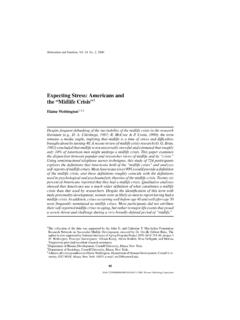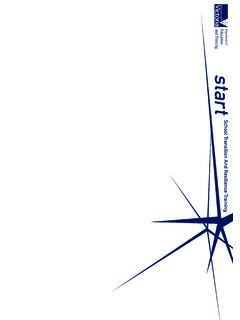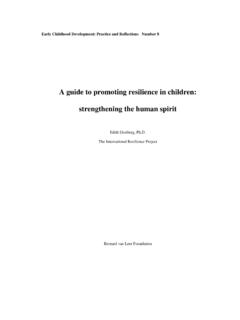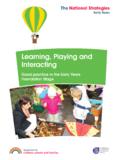Transcription of resilience in aging: literature review - MIDUS
1 DOI: 1475. resilience in aging : literature review review Arlete Portella Fontes 1. Anita Liberalesso Neri 1. Abstract Psychological resilience is comprised of an adaptive functioning standard before the cur- rent and accumulated risks of life. Furthermore, it has a comprehensive range of psychological re- sources which are essential to overcome adversi- ties, such as personal competences, self-beliefs and interpersonal control which interact with the so- cial networks support. The objectives are to show the concepts of psychological resilience in elderly, relative to dominant theoretical models and the main data about psychological resilience in aging , found in an international and Brazilian review from 2007 to 2013.
2 The descriptors resilience , psychological resilience and aging , resili ncia e envelhecimento, velhice e velho , were used in PubMed, PsychInfo, SciELO and Pepsic databas- es. Fifty three international and eleven national articles were selected. The international articles were classified in four categories: psychological and social coping resources, emotional regulation before stressing experiences, successful resilience and aging and correlates, and resilience measures. The Brazilian articles were grouped in three: psy- 1. Programa de P s- chological and social resources, resilience in carers Gradua o em and theory review .
3 Articles on psychological re- Gerontologia, Faculdade sources and on emotional regulation prevailed as de Ci ncias M dicas. Universidade Estadual de key factors associated with psychological resilience Campinas. Av. Tessalia in aging . Vieira de Camargo 126, Key words resilience , Coping, emotional regu- Cidade Universit ria. 13083- 887 Campinas SP Brasil. lation, Elderly 1476. Fontes AP, Neri AL. Introduction keywords adaptation, vulnerability, resilience model, the elderly and life events, found 44 ar- In physics the term resilience is a property by ticles, in which he identified four central themes: which the energy stored in a deformed body is precursors to resilience , resilience and aging , the released when elastic deformation ceases 1.
4 Oth- importance of protective factors, and resilience er fields, including psychopathology, also use and successful ageing. In the latter, resilience was the term to refer to the heterogeneity of coping associated with a low likelihood of illness, pres- responses utilized by children in face of major ervation of cognitive and physical functioning life stressors such as disease, socioeconomic dif- and engagement with life, which are described ficulties, parental psychopathology and ruptures by Rowe and Kahn10 as indicators of successful in the family unit, whereby one succumbs to ageing.
5 Such experiences, escapes unharmed or becomes With reference to essential psychological re- stronger2. The study of resilience in the field of sources for overcoming adversity and ensuring psychology started around 30 years ago, when a return to normal levels of functioning and de- development psychologists began to observe velopment after stressful situations, the construct that exposure to adversities posed a likely risk for of resilience is defined as patterns of adaptation child development3. The attention given to resil- in face of biological, socioeconomic and psycho- ience in adult life and old age was influenced by logical risks6-9,11-14.
6 In old age, these risks include a movement known as positive psychology4 and exposure to stressful life events such as death of notions such as intra-individual plasticity5 and loved ones, accidents, illness and disability, pov- capacity for cognitive reserve6. erty, abandonment, family conflict, domestic and Currently, the term resilience is used in var- urban violence, chronic tension related to social ious academic contexts, including the field of roles. lifespan development, developmental stage the- Based on the above context, this article pres- ories focussing on adolescence, adult life and old ents an updated review of articles on resilience in age, recovery from traumatic events, and organi- the elderly published in Brazil and internation- zational performance7.
7 Ally. It has a dual objective: to present the con- A bibliographical review carried out by Souza cepts associated with the predominant theoret- and Ceverny8 of the period 1986 to 2004 utiliz- ical models in this field; to present the results of ing the Medline (Medical literature Analysis and a bibliographical review of related articles pub- Retrieval System Online), Lilacs (Latin Ameri- lished in Brazil and in international journals be- can and Caribbean Center on Health Sciences tween 2007 and 2013. Information) and APA (American Psychological Association) databases and using resilience as a Variations in the construct of resilience keyword, showed that the number of publica- in old age tions tripled in each five-year period.
8 The review also shows that the number of articles addressing The predominant theoretical models that resilience in children and adults has increased, have formed the foundation of much of our cur- particularly in recent years, and that the first rent understanding of resilience are permeated article dealing with resilience in the elderly was by a classical notion of resilience as a personality published in1999. After 1999, APA's database in- trait or as a process15. As a personality trait, re- cluded themes such as religion, racism, family silience is seen as a stable resource that enables violence, homosexuality, and terrorism survival8.
9 A stable performance when it comes to resisting The most common research topics found on the stress. In this sense, resilience is the tendency to Brazilian databases CAPES (Brazilian Federal respond to stress in a flexible rather than rigid Agency for Support and Evaluation of Graduate manner. Based on this view, the construct of Education), SciELO (Scientific Electronic Li- hardiness16 is as a set of traits, such as commit- brary Online) and Universia (information portal ment, control and openness to change, which can of knowledge and applied research and institu- be seen as a general disposition to resist stress.)
10 Tional collaboration between universities and It should be noted that this individual-centred companies) are family, adolescents and children, approach runs the risk of underestimating the with only five publications involving adults and role of variable factors which are external to the five on the elderly8. event, without offering a description of the event Laranjeira's9 review utilising Medline, Lilacs and how it happened. In the view of resilience as and the APA database PsycINFO and using the process, the construct is seen as a bridge between 1477.













